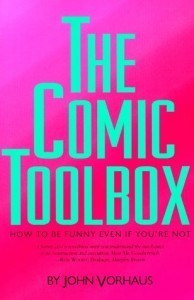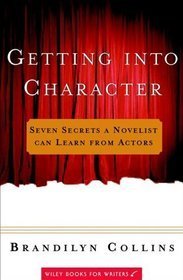Alison Kent's Blog, page 17
June 29, 2011
The Career Novelist by Donald Maass
Successful New York literary agent Donald Maass has guided many fiction writers from first book to full-time career. In The Career Novelist, Maass has gathered his considerable experience and insight both as an agent and as an author of fourteen novels and put it into one indispensable source. From Maass, learn about:-The dream and reality of being a published author
-How to choose an agent
-The marketing game
-Collaborations
-Electronic rights and much much more!Whether you are launching or jumpstarting your writing career, The Career Novelist is the place to start.
I'll be posting giveaway books throughout the day each day this week. If you're interested in this book, leave a comment below. I'll draw all of this week's winners on Sunday, July 3, 2011 and post them that day. You will need to check back and send me your mailing address by Sunday, July 10, 2011 CDT if you are one of the winners.
June 28, 2011
Writing the Thriller by T. MacDonald Skillman
The first thing T. Macdonald Skillman sets out to do in Writing the Thriller is define the thriller. Unlike the mystery, she says, "Suspense is emotional. It's surprise and confusion and fear and anticipation. And suspense is danger. Immediate danger." Thrillers come in a variety of guises: action-adventures; legal, medical, techno-, and political thrillers; psychological suspense; romantic-relationship suspense; women-in-jeopardy suspense. Skillman addresses each element of fiction writing–such as setting, dialogue, and point of view–as it applies to the various types of thriller. For all thrillers, she says, it is best to begin "in the midst of the action or danger"; any subsequent back story should "add a new dimension to the suspense itself." And the pacing should be "like climbing a long, steep series of stairways…. As you cling to the railing at the bottom of the last set of stairs, your heart is pounding; your lungs are burning." Most useful here are Skillman's case studies in plotting, for which she creates eight plots (one for each type of thriller) using the same cast of characters.For the book's final 60 pages, Skillman hands the baton to 11 thriller writers. From Clive Cussler (Flood Tide), we learn that never growing up is "a pretty good prerequisite for writing action-adventure novels." Both Michael Connelly (Blood Work) and Tess Gerritsen (Bloodstream) discuss how their genre can be used to tap into what ills the near future holds. Richard North Patterson (Degree of Guilt) likes to consult with psychologists to get a handle on his characters' motivations, while Mary Willis Walker (All the Dead Lie Down) "love[s] doing research that feels a little bit risky." And any thriller writer would be wise to keep John Gilstrap's (Nathan's Run) words in mind: "If you're going to write convincing suspense, you ought to be scared of it yourself."
I'll be posting giveaway books throughout the day each day this week. If you're interested in this book, leave a comment below. I'll draw all of this week's winners on Sunday, July 3, 2011 and post them that day. You will need to check back and send me your mailing address by Sunday, July 10, 2011 CDT if you are one of the winners.
The Comic Toolbox by John Vorhaus
Comedy is not magic, not inspiration, not a "gift." Mostly, it's simple rules and structures—the logic of the illogical—tools that anyone can use.The Comic Toolbox is a straightforward, often humorous, workbook approach to comedy writing as creative problem solving. In it, veteran Hollywood comedy writer John Vorhaus offers his tools of the trade to writers, comics, and anyone else who wants to be funny. Among these indispensable tools are Clash of Context, Tension and Release, The Law of Comic Opposites, The Wildly Inappropriate Response, and The Myth of the Last Great Idea.
Readers will learn that comedy = truth and pain (the essence of the comic situation), that fear is the biggest roadblock to comedy (kill your ferocious editor within and rich, useful comic ideas will flow), and much, much more.
With Vorhaus' tools in hand, anyone can be funny.
I'll be posting giveaway books throughout the day each day this week. If you're interested in this book, leave a comment below. I'll draw all of this week's winners on Sunday, July 3, 2011 and post them that day. You will need to check back and send me your mailing address by Sunday, July 10, 2011 CDT if you are one of the winners.
Immediate Fiction by Jerry Cleaver
Covering the entire process from story building to manuscript preparation and marketing, Jerry Cleaver shows the novice and experienced writer how to start writing and how to get immediate results.Readers will find everything they need to know about managing time, finding an idea, getting the first ford down on the page, staying unblocked, shaping ideas into compelling stories, and submitting their work to agents and publishers.
Immediate Fiction goes beyond the old "Write what you know" to "Write what you can imagine." Filled with insightful tips on how to manage doubts, fears, blocks, and panic, Immediate Fiction will help writers develop their skills in as little minutes a day, if necessary.
Believing that all writing is rewriting, Cleaver says, "You can't control what you put on the page. You can only control what you leave on the page." With this book Cleaver shows how to get that control and produce results.
I'll be posting giveaway books throughout the day each day this week. If you're interested in this book, leave a comment below. I'll draw all of this week's winners on Sunday, July 3, 2011 and post them that day. You will need to check back and send me your mailing address by Sunday, July 10, 2011 CDT if you are one of the winners.
June 27, 2011
Writing Books I Can't Live Without
Since I'm giving away bunches of writing books this week, I thought I'd repost the following from 7/13/09 about what books will always be in my writing library.
*****
Over the twenty year course of my writing career, sixteen of those years as a published author, I've purchased thousands of dollars worth of how-to, craft and advice books, as well as workshop recordings. Some I've given away having never read through as I realized the author's take on the subject didn't resonate with me. Some remain untouched on my shelves. Others I've kept because I've gleaned a tidbit or two of useful information, or even a quote such as Anne Lamott's from BIRD BY BIRD that has seen me through all the pages looming between me and a deadline:
"Thirty years ago my older brother, who was ten years old at the time, was trying to get a report on birds written that he'd had three months to write. [It] was due the next day. We were out at our family cabin in Bolinas, and he was at the kitchen table close to tears, surrounded by binder paper and pencils and unopened books on birds, immobilized by the hugeness of the task ahead. Then my father sat down beside him, put his arm around my brother's shoulder, and said. 'Bird by bird, buddy. Just take it bird by bird.'"
When it comes down to "can't write without," there are only three books that have had such an impact: Dwight Swain's TECHNIQUES OF THE SELLING WRITER, Chrisopher Vogler's THE WRITER'S JOURNEY and Robert McKee's STORY. I don't consciously use everything these three books offer, but each teaches a storytelling element I can't live without. Later this week (hopefully), I'll go into more detail about the Swain and Vogler books, but briefly, here are my takeaways from all three.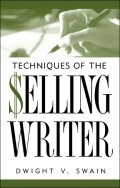 1 – Everything I ever learned about pacing came from Dwight Swain. I was in my first critique group, having sold my first book on my own, and one of my new and brilliant critique partners used the words "scene and sequel." I had no idea what she was talking about. On her recommendation, I bought THE TECHNIQUES OF THE SELLING WRITER, read about scene and sequel, and realized she was right. My pacing was a mess because I was not following the steps of reactions and decisions. Laid out as it is by Swain, it seems so simple, so obvious, yet I am not a natural storyteller, and the lesson in structure was invaluable to me.
1 – Everything I ever learned about pacing came from Dwight Swain. I was in my first critique group, having sold my first book on my own, and one of my new and brilliant critique partners used the words "scene and sequel." I had no idea what she was talking about. On her recommendation, I bought THE TECHNIQUES OF THE SELLING WRITER, read about scene and sequel, and realized she was right. My pacing was a mess because I was not following the steps of reactions and decisions. Laid out as it is by Swain, it seems so simple, so obvious, yet I am not a natural storyteller, and the lesson in structure was invaluable to me.
(I should interject a note here that I listened to the recording of a workshop given by a NYT author at the 2008 RWA National Conference where she mentions scene and sequel – and what she was talking about sounded like cliffhangers, and that is not Swain's definition.)
 2 – Everything I ever learned about plotting through came from Christopher Vogler. I attended a workshop he gave to the Houston Writers League in 2000 and took pages and pages of notes as he went through the elements of the hero's journey. I've used his method ever since, and though I don't always lay out every piece of the pie, it's now pure instinct to know to put my story's inciting incident at a certain spot in the manuscript, to give my characters mentors and enemies, to drop them into hell before allowing them to make their way back with the chalice. I can no longer watch a movie without looking for the steps of the hero's journey; it's that ingrained in my analysis and enjoyment of story. Vogler's work is based on Joseph Campbell's THE HERO WITH A THOUSAND FACES, and Vogler says on his website:
2 – Everything I ever learned about plotting through came from Christopher Vogler. I attended a workshop he gave to the Houston Writers League in 2000 and took pages and pages of notes as he went through the elements of the hero's journey. I've used his method ever since, and though I don't always lay out every piece of the pie, it's now pure instinct to know to put my story's inciting incident at a certain spot in the manuscript, to give my characters mentors and enemies, to drop them into hell before allowing them to make their way back with the chalice. I can no longer watch a movie without looking for the steps of the hero's journey; it's that ingrained in my analysis and enjoyment of story. Vogler's work is based on Joseph Campbell's THE HERO WITH A THOUSAND FACES, and Vogler says on his website:
In his study of world hero myths Campbell discovered that they are all basically the same story – retold endlessly in infinite variations. He found that all story-telling, consciously or not, follows the ancient patterns of myth, and that all stories, from the crudest jokes to the highest flights of literature, can be understood in terms of the hero myth; the "monomyth" whose principles he lays out in the book.
 3 – Everything I ever learned about, well, so many things came from Robert McKee. I attended a workshop he gave at the RWA National Conference in, I believe, Chicago in 1999. I also attended a workshop given in Houston by Jo Leigh in 1995 or so where she used much of McKee's work. My biggest takeaway? The life values in scenes and the negation of the negation. This isn't an easy book to get through, and to this day I have trouble grasping some of what he says. Same with the Swain book. Both are dense and, for me, have required more than one read. Since I won't be workshopping anything from STORY, here are McKee's Ten Commandments of Writing from Down The Tubes:
3 – Everything I ever learned about, well, so many things came from Robert McKee. I attended a workshop he gave at the RWA National Conference in, I believe, Chicago in 1999. I also attended a workshop given in Houston by Jo Leigh in 1995 or so where she used much of McKee's work. My biggest takeaway? The life values in scenes and the negation of the negation. This isn't an easy book to get through, and to this day I have trouble grasping some of what he says. Same with the Swain book. Both are dense and, for me, have required more than one read. Since I won't be workshopping anything from STORY, here are McKee's Ten Commandments of Writing from Down The Tubes:
ONE: Thou shalt not take the crisis/climax out of the protagonists' hands. The anti-deus ex machina commandment. No surprises!
TWO: Thou shalt not make life easy for the protagonist. Nothing progresses in a story, except through conflict. And not just physical conflict.
THREE: Thou shalt not give exposition for strictly exposition's sake. Dramatize it. Convert exposition to ammunition. Use it to turn the ending of a scene, to further the conflict.
FOUR: Thou shalt not use false mystery or cheap surprise. Don't conceal anything important that the protagonist knows. Keep us in step with him/ her. We know what s/he knows.
FIVE: Thou shalt respect your audience. The anti-hack commandment. Not all readers know your character. Very important.
SIX: Thou shalt know your world as God knows this one. The pro- research commandment.
SEVEN: Thou shalt not complicate when complexity is better. Don't multiply the complications on one level. Use all three: Intra-Personal, Inter-Personal, Extra-Personal
EIGHT: Thou shalt seek the end of the line, the negation of the negation, taking characters to the farthest reaches and depth of conflict imaginable within the story's own realm of probability.
NINE: Thou shalt not write on the nose. Put a sub text under every text.
TEN: Thou shalt rewrite.
Further references:
Outline of Robert McKee's STORY
A Practical Guide to THE HERO WITH A THOUSAND FACES
Vogler's Storytech Literary Consulting
Getting Into Character by Brandilyn Collins
Proven techniques for creating vivid, believable charactersWant to bring characters to life on the page as vividly as fine actors do on the stage or screen? Getting into Character will give you a whole new way of thinking about your writing. Drawing on the Method acting theory that theater professionals have used for decades, this in-depth guide explains seven characterization techniques and adapts them for the novelist's use.
In this unique and practical book, you'll discover concepts that will help you understand and communicate the behavior, motivation, and psychology of every fictional character you create. Examples from classic and contemporary novels show you how these techniques have been used to dazzling effect by Jane Austen, Mark Twain, Steve Martini, Anne Rivers Siddons, and others. These simple yet highly effective techniques will help you:
* Create characters whose distinctive traits become plot components
* Determine each character's specific objectives and motivations
* Write natural-sounding dialogue rich in meaning
* Endow your characters with three-dimensional emotional lives
* Use character to bring action sequences to exuberant life
* Write convincingly about any character facing any circumstance
I'll be posting giveaway books throughout the day each day this week. If you're interested in this book, leave a comment below. I'll draw all of this week's winners on Sunday, July 3, 2011 and post them that day. You will need to check back and send me your mailing address by Sunday, July 10, 2011 CDT if you are one of the winners.
The Right to Write by Julia Cameron
What if everything we have been taught about learning to write was wrong? In The Right to Write, Julia Cameron's most revolutionary book, the author asserts that conventional writing wisdom would have you believe in a false doctrine that stifles creativity. With the techniques and anecdotes in The Right to Write, readers learn to make writing a natural, intensely personal part of life. Cameron's instruction and examples include the details of the writing processes she uses to create her own bestselling books. She makes writing a playful and realistic as well as a reflective event. Anyone jumping into the writing life for the first time and those already living it will discover the art of writing is never the same after reading The Right to Write.
I'll be posting giveaway books throughout the day each day this week. If you're interested in this book, leave a comment below. I'll draw all of this week's winners on Sunday, July 3, 2011 and post them that day. You will need to check back and send me your mailing address by Sunday, July 10, 2011 CDT if you are one of the winners.
June 26, 2011
A Left Behind & NOT Loving It Writing Book Giveaway
This is the week of the Romance Writers of America national conference. Often in the past, author Lynn Viehl and others offered online workshops for those who were "left behind and loving it." 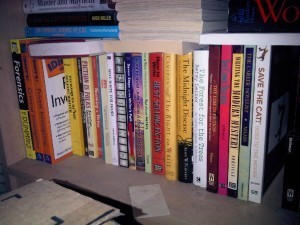 I am left behind this year, again, but I'm not loving it. I'm totally missing my buds and envious of the trip to NYC. That said, since I'm going to have to have some dental surgery that will cost me just about the same as it would have going to the con, it's a good thing I canceled my plans and didn't go.
I am left behind this year, again, but I'm not loving it. I'm totally missing my buds and envious of the trip to NYC. That said, since I'm going to have to have some dental surgery that will cost me just about the same as it would have going to the con, it's a good thing I canceled my plans and didn't go.
::sniff, sniff::
Part of the "Left Behind and Loving It" online workshops was book giveaways related to the posts, and I'm going to be doing that this week. I'll also repost some of my workshops, but I've got a gazillion books I need to clear from my shelves. I'm actually getting rid of my shelves since I've gone to 99% digital reading, and I need to reclaim some floor space.
The husband and I did some major garage cleaning over Easter weekend, and I found even more writing books I'd stored when making room for my fiction.  I do miss all the spines tempting me to pull them off the shelves, but I love having those same titles (because I bought many of them again in digital format) all in the palm of my hand. The things about instructive texts, however, is that they're best read with sticky notes and a highlighter in hand. And most of the ones I have have very few marks at all, so the winners can do their own notetaking. (And the photos here are just representative. Some of these books I'm keeping!)
I do miss all the spines tempting me to pull them off the shelves, but I love having those same titles (because I bought many of them again in digital format) all in the palm of my hand. The things about instructive texts, however, is that they're best read with sticky notes and a highlighter in hand. And most of the ones I have have very few marks at all, so the winners can do their own notetaking. (And the photos here are just representative. Some of these books I'm keeping!)
Check back tomorrow for the first giveaway! I'll post details then on how to comment for the books you may want!
June 23, 2011
SEAL of My Dreams – a charity anthology
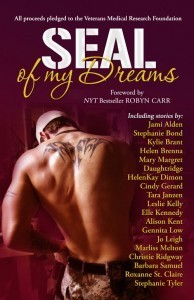 I was off at the dentist first thing this morning and missed getting to make the SEAL of My Dreams anthology announcement along with the rest of the participating authors. So I thought it would be fun to tell the story of how this anthology came about.
I was off at the dentist first thing this morning and missed getting to make the SEAL of My Dreams anthology announcement along with the rest of the participating authors. So I thought it would be fun to tell the story of how this anthology came about.
(You can click the cover for a larger version. You know you want to. *g*)
Back on May 5th, author Christie Ridgway tweeted the following:
Has everyone seen this SEAL photo? Makes me feel very, uh, patriotic. http://nyti.ms/jLRdAC
She followed that up on May 6th with this tweet:
We could all get together & write antho inspired by ystdy's SEAL. Donate proceeds to military charity, something like that.
We messaged back and forth the rest of the day about logistics, then moved to email and did some brainstorming of how we would publish such a thing, what story length we would want, cover artists, authors (how many & who), editors, etc. And there were definitely some some, "Ack! What are we getting ourselves into?" emails in there as well. But on Mother's Day, May 8th, even though we said we'd wait till Monday, LOL, we started sending out invitations to authors. Unfortunately, not everyone we asked was able to participate but we ended up with am amazing list of talent, woot!
One thing we KNEW we wanted was to be able to use the SEAL photo from the NYT. I saw that it was a Getty Image photo, tracked it down on their website, researched the photographer (who is a Pulitzer prize winner) and emailed with their sales department over a couple of days to arrange the license. Then I emailed the uber talented Frauke Spanuth of Croco Designs about doing the cover, and voila! Isn't she a genius?
Christie spent the same time researching charities and finding one who is SO excited to have our contribution. They're doing a lot of research into traumatic brain injury. Additionally, the publicity they're planning made this a win-win partnership.
After a lot of thought on how long it would take to pull this project together, we decided to launch the digital version of the anthology on Veteran's Day, with the print version to follow shortly thereafter. We've set up a placeholder website and the authors attending RWA in NYC next week will have romance trading cards to give out.
Anyone who's associated with the romance community knows the generous nature of those involved, and this project could never have happened without so many giving so much. I'm thrilled to be part of it and can't wait to see the end result!
June 21, 2011
On being edited, by self and by others
Whew. Sorry I kinda disappeared there. Last Wednesday was the deadline for my Carina novella. I got it sent off around midnight on Tuesday, then gave myself permission to do nothing on Wednesday. Gave myself the same permission on Thursday, and did a lot of TV watching (finished streaming Saving Grace from Netflix) and reading. By Friday I finally had to dress and venture out, but then it was the weekend, and I spent half of Saturday with the grandkids, and the other half of Saturday with the husband. 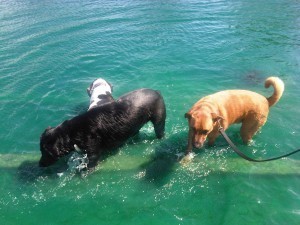 We had car issues and actually have two in the shop right now, and on Sunday we took the dogs to swim at the park, then it was time for groceries and to get back to life and to writing.
We had car issues and actually have two in the shop right now, and on Sunday we took the dogs to swim at the park, then it was time for groceries and to get back to life and to writing.
I always hate starting a new story when I know I'll be going back to the one I just finished to do editorial fixes. It's a weird switch of mental gears moving between worlds but it has to be done. I'm a pretty good writer, but that doesn't mean I don't want to be edited. Bugs me when authors say otherwise. It's part of the program, and that professional editorial eye makes the work stronger. True, some editors can get a little sticky with the fingers in the pie, but most I've worked with have nothing but the good of the story in mind when they make suggestions. I've already got a big edit I'm forcing on myself which has to do with the snowy setting. I don't know for snow, but know someone who's an expert. She took pity on me, and my story's horse, and made a suggestion that gets my characters where I need them to be without messing up the rest of the logic.
Now I'm moving into the white hot Texas summer for the first of my Berkley Heat books. White hot Texas summers I know, so I feel right at home in Crow Hill with Dax and Arwen. The tentative release date for the tentatively titled UNDENIABLE is November 2012. Yes, a LONG time away, but hey. I have to write it first! I also had to work some plotting magic. See, when first proposed, the three synopses I wrote were novella length for a single author anthology. But the first two stories are now full novel length. So I spent some brain time over the weekend and again yesterday reading through what I had to find a workable subplot. And I did, so I'm forging ahead!
Next week is the annual Romance Writers of American national conference, and I'm not going this year. What I am going to do, however, is give away a bunch of my writing books, ones I no longer need and someone else may get some use out of. More on that later. For now, I've got to get back to the cowboys …
Alison Kent's Blog
- Alison Kent's profile
- 644 followers




